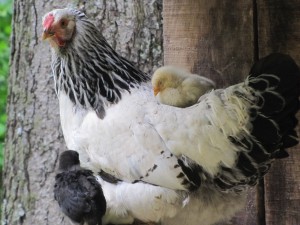
Photo by Jean Kirkhope
It’s normal for hens to go broody. Some breeds — such as Buff Orpingtons, Cochins, or Silkies, and many breeds of bantams — are more prone to go broody than others, but even production breeds can, on occasion, go broody. Black Stars are a production breed that rarely goes broody, but this spring, one of the Black Stars in my home flock went broody, and she already appears to be going broody a second time.
If You Only Have Hens
If you have only hens in your flock, as is the case for many urban flocks, the eggs won’t be fertile and won’t hatch, so there won’t be any point in letting the hen sit on those eggs. If you want to hatch chicks under your broody hen, you may be able to get fertile eggs from someone in the area and swap them out. The best time to do this is at night, so that you don’t disturb the hen any more than necessary. Gently remove the non-fertile eggs from beneath her and replace them with fertile eggs. One of my hens is very defensive when she goes broody, so I wear a pair of welding gloves when handling her. She will repeatedly peck hard at my hands, but I can barely feel it through the gloves.
Letting a Broody Hen Hatch Chicks
It takes about 21 days for a hen to hatch eggs. Since she will be sitting on the eggs in a nest box for most of that time, occasionally getting up for a drink or to eat a few bites of feed, and since the babies will be small and vulnerable once they hatch, it’s best to isolate her so she can sit without being disturbed by other chickens. A small coop (2 feet by 4 feet) or chicken tractor works well for this. Provide a small waterer (1 gallon size should be plenty) and a small feeder for her.
As the hatch date draws near, be sure to also have on hand some starter feed for the chicks. Starter feed contains more protein than layer feed and is formulated to help the baby chicks grow properly. It will be fine for the broody hen, too.
As the baby chicks start to hatch, check on them frequently (several times a day) to make sure they are doing okay. Fire ants can be a problem in the southern states. If you encounter them, use an organic pesticide, such as Rotenone around the broody coop.
Let the broody hen sit for a few more days after the first hatch so that additional eggs can hatch. You can also candle eggs to determine whether they are developing.
“Breaking” a Hen of Broodiness
If you decide that you don’t want your hen to sit, then as soon as you notice that she has gone broody, transfer her into a cage that is well lit and that has a wire mesh bottom made out of hardware cloth. The floor of the cage should be several feet off the ground. The idea is to make the cage not feel very private to the hen. As always, continue to provide her with food and water. Usually within a few days, she will cease to be broody, then you can unite her with the rest of the flock.



I’ve been raising multiple varieties of chickens for three years and have been very disappointed trying to get broody hens. The buff orpingtons would try to go broody, then give up, or go broody in the winter which was unacceptable, or go broody and eat the eggs. I got some Dorkings because they were supposed to be a broodier breed, but so far no indication of that yet. However, I have three one-year old blue-laced red wyandotte hens from MM. I haven’t heard of wyandottes being a particularly broody breed, but this year all three of them went broody on the same day and successfully hatched chicks!
I had two hens that went broody at the same time. One is as Easter egg hen and the other is a barred hen. I don’t have any roosters but I do have a mated pare of ducks so I placed six duck eggs under the hens. Most of the time they would rotate the eggs between each other. About three weeks into this someone brought me a fertile chicken egg. I added it to the mix. Sure enough 6 ducklings hatched out and bonded to their chicken mom. I placed her and the babies in separate place and left the barred hen with the chicken egg. At 22 days I was going to throw out the chicken egg but to my delight there was a little fuzzball. I now have a chick following his mom and six ducklings following their Easter egg Chicken mom. She keeps yelling at her kids, “Ya’ll kids get of that water!”
I have a broody Buff of about 3 years. A few weeks ago I added MMc 6-9 week old Sex-Links. Ol Broody immediately took over as mother hen. The older hens knew better than to bother “her” babies. Everyone is happy – what a nice development.
One of mine blue laced red Wyandottes is broody right now. I’m using her to incubate my fertilized eggs in lieu of my incubator. Just for fun. I got my son’s football coach to start raising his own eggs after I gave him and rest of his coaches eggs for Christmas. He wants some more hens, I gave him 5 of my laying golden laced Wyandotte to get him started.
Last year got a 75 bird order from MM. Many varieties to try at my mile high altitude.
I have had one of my Delaware’s went broody , now a Partridge Rock, A Buff Minorca has gone broody twice, as did a Golden Polish , she took to her eggs and should hatch tonight. Not known as a setting hen, we’ll see how the Polish does.
My consistent brood hens are Old English game, bantam and mid-size, great protective Mothers.
Seems to be a lost skill using brood hens, I’ve had about 20 hatches this year under the Mother hens, visitors to the farm enjoy the site.
Looking forward to my next MM order to try some other varieties.
I’ve done this often, and with success. Like you, one of the best broody hens I ever had, bar none, was a Black Star. I think it is very important to isolate the broody, once you are sure she is broody. For me this works best at night. If you leave her where other hens are around, they too will lay in the nest, chilling and breaking the eggs, and if you don’t know which eggs are which you will get eggs hatching at different times, or much more likely a complete loss. Marking the original eggs doesn’t work that well either, those other hens coming and going push them around so much that they end up getting broken, chilled, pushed out of the nest, etc. Also, I’ve found that even good broody hens don’t necessarily have the sense to get back on their original nest after leaving to eat and drink if there are other nests with eggs around, leaving her original eggs to chill and die. I’ve occasionally had a broody who refused to be moved, but leaving her where she is rarely ever worked either for the reasons I’ve already stated. On the other hand waterfowl are more intelligent about brooding in a group/with other nests around and I’ve rarely had any of these problems with them.
Have a city flock and one banty has gone broody 4 separate times –deciding whether to get fertile eggs, but once they hatch will she stop being broody?
It’s still possible that she will go broody again, even after raising her chicks. My buff orpington hatched 4 chicks in March and another 8 just two weeks ago. As soon as the first hatched were old enough to handle life without her she was ready to raise us some more! That’s great if you or someone you know wants chicks…but I feel like its got to wear the hen down too.
She will not lay until her chicks are old enough to be on their own. You can do like me and order some chicks. They will send them to you via mail. Go out at night and put them under her while she is on the nest. When she wakes up she assumes she hatched them and will call them her own.
My Buff Orpington was broody. So I went to my hatchery. Picked up 4 keets and 4 Rhode Island chicks. Went out at night. Placed them under her. Went out in the day time and she had them under her, growled and pecked me when I went to check on them. They are 100% hers now.
They have also been known to raise ducklings. Although ducklings will drive a chickens nuts when they play in the water.